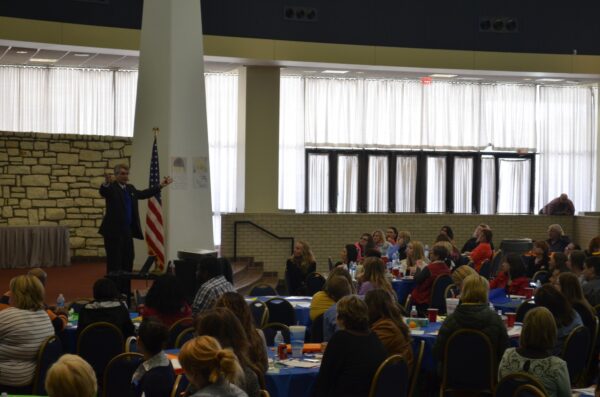
Photo by PERLA ARELLANO | The Ranger
Frank Kros, career child advocate, spoke to members of the community who work with children at the 14th Annual Child Abuse Prevention Conference at the Amarillo Civic Center March 27.
Victor Vieth and Frank Kros were the featured speakers at the 14th Annual Child Abuse Prevention Conference Thursday at the Amarillo Civic Center. Kros, a career child advocate, also spoke Wednesday on the Amarillo College Washington Street Campus.
Pinkie Porcher, child abuse prevention advocates chairwoman, said she has been involved with the annual conference since its first year. According to Porcher, 500 people attended the event from the 52 agencies, business and organizations that acted as sponsor or supportive organizations. The conference takes place in March as a kick-start for Child Abuse Prevention Month in April, Porcher said.
Sponsors help fund the conference, and supporting organizations help with work needed during the event.
The AC criminal justice program was listed as a sponsor. Two departments, the AC Center for Continuing Healthcare Education and the AC child development/early childhood education program, were listed as supporting organizations.
Eric Wallace, coordinator of intervention programs in the AC criminal justice program, said child abuse is an important topic that needs to be addressed to bring down the rate of occurrence in the community.
Wallace said that previously, only local speakers were heard at the event. Because of the support received from members, conference coordinators were able to bring in national speakers.
“It is important to bring in people from outside with different ideas that maybe we haven’t heard of here,” Wallace said.
A $25 fee covers an attendee’s lunch and the cost of their continuing education hours.
According to the Department of State Health Services, the 26 counties in the Texas Panhandle have 13.13 victims of abuse or neglect per 1,000 residents. The state average is 9.3 per 1,000.
Amy Hord, a conference committee member and a social work professor at West Texas A&M University, has been involved for six years. Hord said she became involved because of her work with children and the desire to learn about child abuse and child abuse prevention.
Hord said diverse groups of people come to the conference. Attendees range from those who work directly with children, such as Child Protective Services employees, to people who do intervention such as social work and policemen to advocates, attorneys and school professionals.
“We all are affected and touched by abused or neglected children,” she said.
The speakers have worked in the area of child abuse and share their expertise, Hord said.
“The better educated our professionals are, that are working directly with our children, the better the chance is of preventing abuse, intervening when abuse is identified and reducing the risk of harm to the children in our community,” she said.
Hord said even though it is important for professionals to be educated, it also is important for the general public to know the signs of child abuse. If a child gets overlooked, she said, the child could continue in an abusive relationship. By law, people are required to report any suspicion they have of child abuse, Hord said.
Other rates that are high in the Panhandle are the level of families that struggle with income in order to be self-sufficient and poverty levels, said Mary Munger, AC education and child development department chairwoman. Munger has been involved with the conferences for 11 years.
“Sometimes that stress comes out in terms of neglect or abuse of the children,” she said.
Child abuse can happen at all income levels, Munger said, but stress is a factor. She said parents need resources so they do not get to the point of neglecting or abusing children.
Munger said collaboration among members of the community to set up the conference is what makes it beneficial because they are able to meet one another and make new contacts.
“The connections we build is a real valuable piece of what happens at the conference,” she said.
Aimee Campbell, a licensed professional counselor with Panhandle Child Placement Services, has been working with abused children for 12 years. She said she works with children who have been confirmed as abused and have been removed from abusive relationships. Once the children are in the CPS custody, she said, she works to find foster homes for them.
“We are always looking for new or experienced foster parents,” Campbell said. “It’s definitely not an easy job.”
The situation of each child varies. Campbell said in some instances, children can be reunified with their families if it is proven that it is safe for the child to go back home. In other cases, the children will not be able to go back home and a judge may order parental rights to be terminated. If that happens, the children are eligible for adoption. Foster parents can adopt the children or help them make a transition to an adoptive family.
When a foster child turns 18 and still is attending high school or college or working, it is possible for the child to remain in foster care until age 21 if the child voluntarily agrees, Campbell said.
Anyone interested in becoming a foster care parent can call 806-342-5550 or go to the website panhandlechildplacementservices.com.
Abuse can be reported through child abuse hotlines at 1-800-252-5400 or on the website txabusehotlines.org.

Leave a Reply